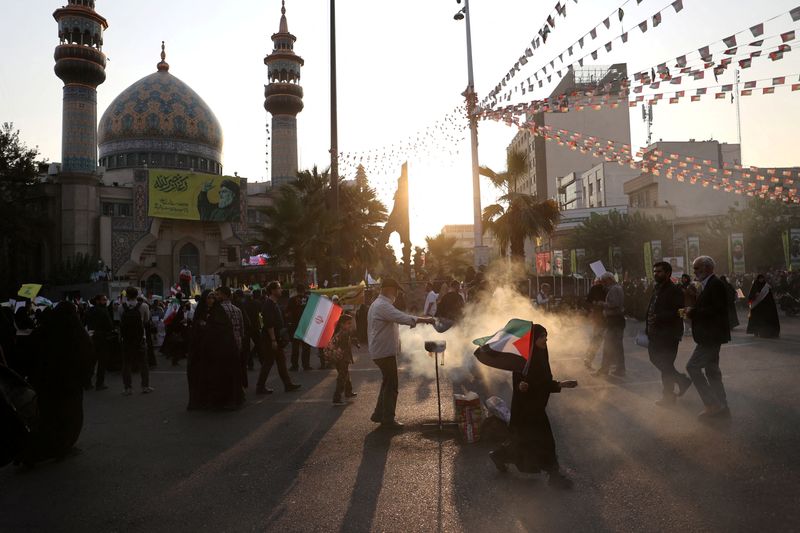By Parisa Hafezi and Andrew Mills
(Reuters) -Tehran has told Gulf Arab states it would be "unacceptable" if they allowed use of their airspace or military bases against Iran and warned that any such move would draw a response, a senior Iranian official said.
The official also said any action by Gulf states to balance oil markets should Iranian energy facilities be hit by Israel was not part of the discussions so far.
The comments come amid growing concern over possible Israeli retaliation for last week's Iranian missile attack, as Iran's Foreign Minister Abbas Araqchi visits Saudi Arabia and other Gulf states including Qatar for talks on Wednesday.
They followed discussions between Iran and Gulf Arab capitals last week on the sidelines of an Asia conference in Qatar, when Gulf states sought to reassure Iran of their neutrality in any conflict between Tehran and Israel.
"Iran made it clear that any action by a Persian Gulf country against Tehran, whether through the use of airspace or military bases, will be regarded by Tehran as an action taken by the entire group, and Tehran will respond accordingly," the senior Iranian official told Reuters.
"The message emphasised the need for regional unity against Israel and the importance of securing stability," he said.
"It also made clear that any assistance to Israel, such as allowing the use of a regional country’s airspace for actions against Iran, is unacceptable."
U.S. President Joe Biden is expected to hold a telephone call on Wednesday with Israeli Prime Minister Benjamin Netanyahu that will include discussion of any plans to strike Iran, according to a person familiar with the matter.
Washington hopes to weigh in on whether the response is appropriate, a separate person briefed on the discussions said. The White House did not respond to a request for comment.
Biden said last Friday he would think about alternatives to striking Iranian oil fields if he were in Israel's shoes. Last week he also said he would not support Israel striking Iranian nuclear sites.
OPEC ACTION NOT PART OF DISCUSSIONS
The Iranian official said Tehran did not discuss the issue of Gulf Arab oil producers raising output if Iranian production were disrupted during any escalation.
U.S. news website Axios, citing Israeli officials, reported last week that Israel could target oil production facilities within Iran as retaliation.
The Organization of Petroleum Exporting Countries, OPEC, which is de-facto led by Saudi Arabia, has enough spare oil capacity to make up any loss of Iranian supply if an Israeli retaliation knocks out some of the country's facilities.
Much of OPEC's spare capacity is in the Middle East Gulf region. Iran has not threatened to attack Gulf oil facilities but has previously warned that if "Israel supporters" intervene directly their interests in the region would be targeted.
Top oil exporter Saudi Arabia has had a political rapprochement with Tehran in recent years, which has helped ease regional tensions, but relations remain difficult.
Saudi Arabia has been wary of an Iranian strike on its oil facilities since a 2019 attack on its key refinery at Abqaiq briefly shut down more than 5% of global oil supply. Iran denied involvement.
A Western diplomat in the Gulf said that during Thursday's Gulf-Iran meeting in Doha, Iran made clear that Tehran had called for regional unity in the face of an Israeli attack and that it considered neutrality of Gulf states a bare minimum.

The diplomat said Iran had made clear that Tehran would keep a close eye on how each Gulf country responded in the case of an Israeli attack, and also how U.S. bases housed in their countries were used.
Bahrain, Kuwait, Qatar, Saudi Arabia and the United Arab Emirates all host U.S. military facilities or troops.